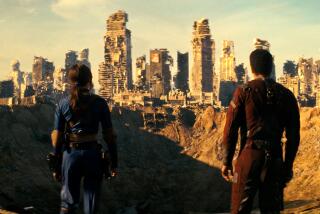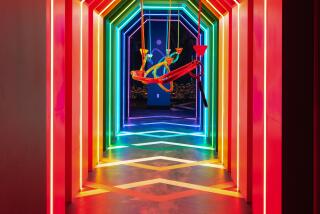Market Scene : Lavish ‘Lost City’ Not Lost on S. Africa Tourists : In 11 months, the $350-million fantasy has lured a million visitors despite the nation’s turmoil.
- Share via
SUN CITY, South Africa — Once upon a time, the creators of this glittering entertainment and gaming resort placed a $350-million wager on an African fantasy called Lost City.
Building boldly on the parched interior, they defied nature with a freshly planted rain forest watered by remote control, a sandy beach washed by machine-made waves, a concrete volcano that spewed non-allergenic smoke and a starry, man-made sky high above its slot machines.
Today, 11 months later, their no-expense-spared fantasy survives. More than a million people have flocked to see this African Never-Never Land.
But the harsh reality of South Africa’s difficult, protracted transition to democracy, and the headlines it has generated, has been an unwelcome intruder. And, as Peter Pan might say, prospective travelers often must be prepared to first close their eyes.
Outbreaks of violence--sometimes in regions of the country more than a thousand miles away--have caused dozens of cancellations by foreign visitors and pounded the resort’s fragile image overseas, a market that is vital to Lost City’s eventual success.
Since the creators of Sun City opened Lost City next door, South Africa has been rocked by the assassination of black leader Chris Hani, unending violence in the black townships, a massacre at a church and, most recently, the news of a Southern Californian Fulbright scholar stabbed to death in a township because she was white.
Such events have understandably frightened away South Africa-bound tourists. With each new act of horrific bloodshed, “I brace myself” for the cancellations, admitted Gerald Inzerillo, an American hotelier and chief operating officer of the Sun City-Lost City complex.
“I literally brace myself,” he added. “I can no longer activate a network and say, ‘Don’t worry. Don’t worry.’ ”
Instead, Inzerillo says he has been taking a more aggressive marketing tack, flying travel agents and travel magazine journalists to South Africa, “generally at my expense, so that I can show them what the real truth is.”
The “real truth” is that Lost City, like most tourist areas of South Africa, exists in a cocoon, isolated from the bloodshed. Even critics of Lost City, and they are few in South Africa, admit it is an astonishing place. And, furthermore, few here doubt the vision of its creator, a workaholic 57-year-old Russian immigrant named Sol Kerzner, who predicts “a major impact on the international tourism marketplace.”
“We’ve lost a number of groups as a result of some of the publicity,” Kerzner said, speaking in a telephone interview from one of his hotels on the Indian Ocean island of Mauritius. “But that’s probably the only disappointing factor.”
Despite the cancellations, occupancy rates for the 338-room Palace at Lost City are running near 90% and the entire complex, which includes 1,200 rooms, has been 70% full. That’s well ahead of hotels elsewhere in South Africa, which is mired in recession, and ahead of Sun International’s expectations.
“We’re pretty pleased with the way it is going,” Kerzner said. “We’re ahead of our forecast.”
But most of Lost City’s visitors--88% through the end of June--have been South Africans. And the resort’s long-term prospects, along with Kerzner’s dreams of adding 1,000 rooms, depend on getting foreigners to visit South Africa first and, then, Lost City.
“The investment we have made is something you lay down, not for a quick overnight return but for the medium term,” Kerzner said. “Once a new government is in place, I’m confident that the political climate will improve. Nobody thought this transition was going to be easy.”
Lost City is a 55-acre African playland that owes as much to Cecil B. de Mille as to its home continent. It is--and why not quote its own publicity?--”brilliantly conceived, superbly built and visually stunning. It would be the envy of Nature herself.”
Some have disagreed, calling it tasteless, brashly extravagant and--a favorite South African expression--”over the top.” But, as the Weekly Mail newspaper in Johannesburg observed soon after the opening, “Try as you please, it’s hard not to admire the energy.”
What Lost City is not is a true lost city. But Kerzner has made up for that by creating the resort’s own, four-page Disneyesque yarn, “The Legend of the Lost City,” written by the resort’s California architect, Gerald L. Allison.
The Lost City, the story goes, was built “many hundreds of years ago by a people who left no written record of their history.” Of course, “the Ancient Ones,” as Allison calls them, did not have a 24-hour casino, a three-story water slide or a golf course with live crocodiles in the water hazards.
The Lost City is anchored by a “restored” home of kings, a hotel called the Palace at Lost City, which features life-size animal carvings, marble floors and hand-carved timber doors on each of its rooms. The prices are definitely 20th Century, with rooms starting at $210 and rising to $2,600 a night.
Actor Lou Gossett Jr., who stopped in while filming “A Good Man in Africa” in Johannesburg, was wowed by his room, the King’s Suite, with its floor of cherrywood mosaic and en suite butler.
“You can’t throw a rock from one end to the other,” Gossett said. “I didn’t want to leave that suite.”
Sun City itself was created 12 years ago amid the squalor and poverty of Bophuthatswana (pronounced baa-POO-tots-wana), itself an imaginary country created by apartheid’s social engineers on seven separate tracts of South Africa.
Back then, Kerzner--a stocky, 57-year-old former South African boxer--saw opportunity in the new homelands, where blacks ostensibly were in charge. While Pretoria banned gambling inside South Africa, such wanton pursuits were OK with the new leaders in the homelands. And those leaders, many of whom were later proven to be corrupt and unabashed puppets of Pretoria, were only too happy to have Kerzner’s investments.
The entrepreneur quickly opened casino resorts in the three other “independent” homelands and some of the self-governing homelands as well. (In fact, Kerzner has admitted that he paid one homeland leader, in the Transkei, $650,000 for the rights to build a casino-hotel there.)
In its early days, Sun City’s marquee glowed with the world’s brightest stars--Frank Sinatra, Barry Manilow, George Benson, Dolly Parton, Chicago, Cher and Liza. On one memorable evening, Elton John, on his way out of town, sat down to play piano for Rod Stewart, who had just arrived.
But sanctions, and a popular song and video performed by Artists Against Apartheid, dimmed the lights in the mid-1980s. And, just as Nelson Mandela was walking free from prison in 1990, Sun City was playing host to Tupperware conventions and dog shows.
Now the good times are back, at least temporarily.
The resort was host to the internationally televised Miss World beauty pageant last December, trotting out a roster of famous folks--Billy Dee Williams, author Sidney Sheldon, Bo Derek and Ivana Trump, to name a few--as judges and commentators in order to prove that the stars are not afraid to grace its controversial marquee anymore. And the pageant organizers have decided to return this year.
More recently, Shirley MacLaine performed here for three nights, telling one audience, “This place reminds me of Jurassic Park or something from one of my past lives.”
Whether Lost City will make money in the long run is anyone’s guess.
But one problem it will have to overcome is its location in Bophuthatswana. Some in the African National Congress say the resort complex helps to prop up a last vestige of apartheid.
Bophuthatswana is not recognized by any nation in the world, except South Africa. The republic’s Miss Bophuthatswana has been ineligible to enter the Miss World pageant held by her own “country.”
The homeland’s leader, Lucas Mangope, has banned ANC political activity in the homeland, on the grounds that it is not a legal party in Bophuthatswana. And although he is participating in multi-party negotiations, Mangope has vowed to fight reincorporation into a country ruled by the ANC.
Kerzner figures the homeland problem will be resolved at the bargaining table. (He contends that his resorts provide several thousand jobs, including managerial posts, for blacks.)
His biggest long-term worry is that a new government in South Africa might legalize gambling, thus robbing his out-of-the-way casinos of some of their appeal. Sun City, a 90-minute drive from Johannesburg, has made millions from wealthy white South Africans over the years.
The current white-minority government bowed to pressure from Kerzner last year and closed a loophole that had allowed “skill” games such as blackjack to be played in South Africa.
But the gambling king is leaving nothing to chance. Anticipating an ANC-controlled government one day, he has cozied up to the ANC’s foreign affairs chief, Thabo Mbeki; hosted Nelson Mandela’s honeymooning daughter as his personal guest at a Sun hotel in Mauritius, and joined the ANC in setting up a South Africa arts and culture foundation.
“I have little doubt the ANC will see the benefits of private enterprise,” Kerzner said. “And they know it is the only system that will survive.”
Scott Kraft, now The Times’ bureau chief in Paris, recently completed a five-year assignment in South Africa.
More to Read
Sign up for The Wild
We’ll help you find the best places to hike, bike and run, as well as the perfect silent spots for meditation and yoga.
You may occasionally receive promotional content from the Los Angeles Times.







